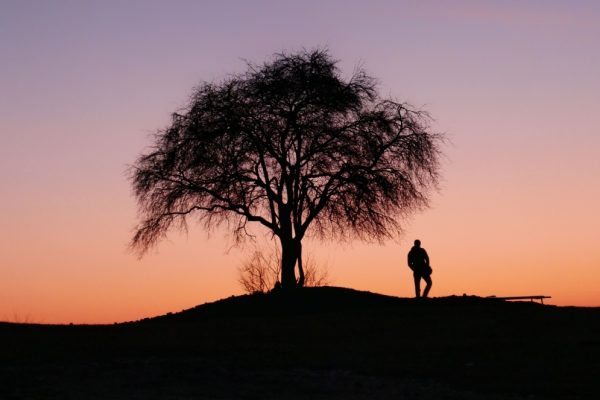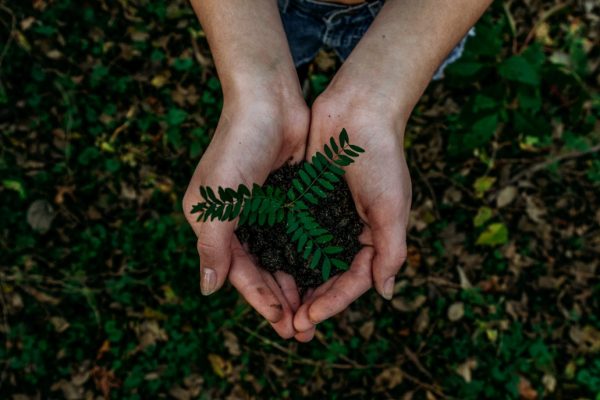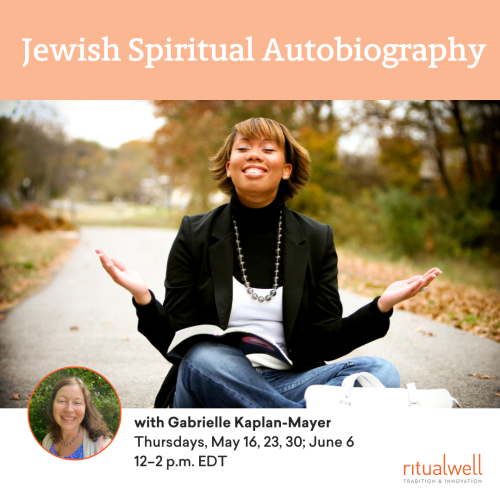Tu Bi’Shevat, the fifteenth day of the Hebrew month of Shevat, once was merely a tax deadline; that is, trees whose fruit had to be tithed to the temple in the fourth year of their growth were counted another year older on that date. However, the mystics of Sfat, the holy mountainous city in IsraelLit. ''the one who struggles with God.'' Israel means many things. It is first used with reference to Jacob, whose name is changed to Israel (Genesis 32:29), the one who struggles with God. Jacob's children, the Jewish people, become B'nai Israel, the children of Israel. The name also refers to the land of Israel and the State of Israel., created a “seder” for the fifteenth day of Shevat. For them, the “birthday of trees” was a day to celebrate God, whom they saw as a great tree reaching down from heaven. The Tu Bi’Shevat sederLit. Order. The festive meal conducted on Passover night, in a specific order with specific rituals to symbolize aspects of the Exodus from Egypt. It is conducted following the haggadah, a book for this purpose. The mystics of Sefat also created a seder for Tu B'shvat, the new year of the trees. honored the four levels on which the mystics perceived Godly and human reality: assiyah, the physical self, the earth, or the Divine Presence among us; y’tzirah, the emotional self, the watery, the Holy One to whom we direct our prayers; b’riyah, the intellectual self, the air, the hidden and creative Divine; and atzilut, the spiritual self, the fire, or the very essence of God. The kabbalists quoted the biblical verse “ha-adam etz ha-sadeh,“ literally meaning: “Is the human a tree of the field?” and read it, “A human is a tree of the field.” They saw the world, God, and themselves as shaped like trees. Later, Tu Bi’Shevat became a time to celebrate the land of Israel and its fruits.
Yet there is a Talmudic passage that some rabbis believed the date of the birthday of the trees was the first of Shevat. Women, or women and men, who celebrate Rosh HodeshThe new moon, which marks the beginning of the Jewish month. According to tradition, because women did not participate in the sin of the golden calf, they were given the holiday of Rosh Chodesh. It is customary for women not to work on Rosh Chodesh. together as a sacred time can honor that minority opinion by engaging in a “Rosh Hodesh Shevat seder.” The Tu b’Shevat seder celebrates the multiple faces of God, and the fruits of the land – this Rosh Hodesh Shevat seder will revive the facets of our souls as we prepare for spring. Instead of a seder of taste, this will be a seder of fragrances. Just as we smell spices to enliven us at the end of havdalahLit. Separation A ceremony performed on Saturday night to mark the end of Shabbat and the beginning of the week, using wine, a braided candle, and sweet-smelling spices., we will use our sense of smell to wake us up to the worlds around us and the worlds within us. Together we will make a spiritual “perfume” for the new spring that will shortly arrive. In Jewish mysticism, the scent represents the soul.
Decorate the space with flowers, and place a particularly beautiful and good-smelling flower in the center of the table. Begin your seder by sitting in a circle on the floor or gathering at a table. Chant a niggunA wordless melody., or sing a song with natural imagery in it. Invite every participant to say her name. Introduce the “seder” by saying that the seder will have four stages relating to four ways of scenting the world.
First Fragrance—The Earth/The World Around Us
Questions for the group to discuss:
What kind of smells do we associate with the outside? With winter? How do smells begin to change when spring arrives? Is there a particular smell we associate with spring every year? Are there any people present who can’t smell most smells? Who smell very acutely? How does this influence how they experience the world? Do the natural smells we love getA writ of divorce. Traditionally, only a man can grant his wife a get. Liberal Jews have amended this tradition, making divorce more egalitarian. swallowed up by man-made things like asphalt? Does the society around us value intangible things like smell?
Ask each participant to name a smell she personally wants to do something to protect. Put all of these scents on a paper “scroll” of “ingredients” for the “perfume” the group is creating.
Place a cinnamon stick, myrtle branch, apple blossom branch, or other fragrant wood in front of each person. Ask each person to smell the object carefully and take in its scent.
Then say the blessing over fragrant woods:
בְּרוּכָה אַתְּ יָהּ רוּחַ הָעוֹלָם, בּוֹרֵאת מִינֵי בְשָׂמִים
B’rukhah at YahA name for God, as in "halleluyah" – praise God. Some people prefer this name for God as a non-gendered option. ruakhLit. Spirit. Some new versions of blessings call God "Spirit of the World" (Ruakh Ha’olam), rather than "King of the World" (Melekh Ha'olam). ha-olam boreit minei v’samim.
בָּרוּךְ אַתָּה יְיָ אֱלֹהֵֽינוּ מֶֽלֶךְ הָעוֹלָם בּוֹרֵא מִינֵי בְשָׂמִים
Barukh attah Adonay Eloheynu melekh ha-olam borei minei v’samim.
Blessed are You, God, Spirit of the Universe, who creates fragrant trees.
Second Fragrance—The Water/The Feelings that Flow Through Us
Questions for the Group to Discuss:
The TalmudThe rabbinic compendium of lore and legend composed between 200 and 500 CE. Study of the Talmud is the focus of rabbinic scholarship. The Talmud has two versions, the main Babylonian version (Bavli) and the smaller Jerusalem version (Yerushalmi). It is written in Rabbinic Hebrew and Aramaic. quotes Genesis, telling us that when IsaacAbraham and Sarah's much-longed-for son and the second Jewish patriarch. Isaac is nearly sacrificed by his father at God's command (Genesis 22). He is married to Rebecca and is the father of Esau and Jacob. His Hebrew name is Yitzchak. smelled his son JacobLit. heel Jacob is the third patriarch, son of Isaac and Rebecca, and father to the twelve tribes of Israel. More than any of the other patriarchs, Jacob wrestles with God and evolves from a deceitful, deal-making young man to a mature, faithful partner to God. His Hebrew name is Yaakov., he said: “See, the smell of my son is as the smell of a field which God has blessed.” The Talmud says that this is the smell of an apple orchard (Taanit 29b). Isaac smells apple blossoms when he smells his son. What smells do we associate with the blessings of our loved ones? What kinds of memories and feelings do we associate with smell?
Ask people to work in pairs. Ask one person in a pair to share, for two or three minutes, a memory of someone they love associated with a smell, to make the memory as concrete as possible to the other person. The other person should listen. Then they should switch. Or else, have each person share different smell-memories with the larger group.
Place an apple, orange, or other fragrant fruit in front of each person.
Then say the b’rakhah over fragrant fruit.
בְּרוּכָה אַתְּ יָהּ רוּחַ הָעוֹלָם נוֹתֶנֶת רֵיחַ טוֹב בַּפֵּרוֹת
B’rukhah at Yah ruakh ha-olam notenet reyakh tov ba-perot.
בָּרוּךְ אַתָּה אֲדֹנָי אֱלֹהֵינוּ מֶלֶךְ הָעוֹלָם נוֹתֵן רֵיחַ טוֹב בַּפֵּרוֹת
Barukh attah Adonay Eloheynu melekh ha-olam notein reyakh tov ba-perot.
Blessed are you, God, Spirit of the Universe, who gives to fruits a good fragrance.
If you wish, you can ask people to eat the fruit, adding a sense. If you do so, say the blessing over eating a fruit: B’rukhah at Yah, Eloheinu ruachLit. Spirit. Some new versions of blessings call God "Spirit of the World" (Ruakh Ha’olam), rather than "King of the World" (Melekh Ha'olam). ha-olam,boreit pri ha-etz or Barukh attah Adonai, Eloheinu melekh ha-olam, borei pri ha-etz.
Third Fragrance—The Wind/The Inner Truths
There is a midrashA rabbinic method of interpreting text, often through the telling of stories. about SukkotLit. Booths or huts Sukkot is the autumn harvest Festival of Booths, is celebrated starting the 15th of the Jewish month of Tishrei. Jews build booths (sukkot), symbolic of the temporary shelters used by the ancient Israelites when they wandered in the desert. Traditionally, Jews eat and sleep in the sukkah for the duration of the holiday (seven days in Israel and eight outside of Israel). The lulav (palm frond), willow, myrtle, and etrog fruit are also waved together. that tells us that the etrogA lemon-like fruit (citron) used at Sukkot as one of the four species. Women desiring to get pregnant were given the pitom (stem) to eat after Sukkot., the citron, represents those who are fragrant with good deeds. Scent can represent the intangible, the world of thought, as well as something real. The Talmud teaches: “At every word that went forth from the Holy One’s mouth at SinaiAccording to the Torah, God, in the presence of the Jewish people, gave Moses the Torah on Mount Sinai (Har Sinai)., the whole world was filled with the fragrance of spices …the Holy One brought forth the wind from God’s store-chambers and caused the fragrance of each word to pass on, so that each new word would smell fresh. This is why it says in the Song of Songs: His lips are like roses.” (ShabbatShabbat is the Sabbath day, the Day of Rest, and is observed from Friday night through Saturday night. Is set aside from the rest of the week both in honor of the fact that God rested on the seventh day after creating the world. On Shabbat, many Jews observe prohibitions from various activities designated as work. Shabbat is traditionally observed with festive meals, wine, challah, prayers, the reading and studying of Torah, conjugal relations, family time, and time with friends. 88b) In our tradition, even God has a smell. What could God’s smell be?
Break the group into three. Give each group pencils, crayons, paper, and any other decorating materials you wish. Ask them to come up with a name for God’s perfume, what that perfume smells like, what its ingredients are, and what kind of bottle it comes in. They have ten minutes to come up with these ideas and draw a picture of the bottle. Have each group present their perfume.
(An alternate to this activity is to gather biblical or Talmudic sayings about smell and teach them to the group, or to discuss the role of smell in the week’s parashahLIt. Portion or chapter. The weekly parashah (parashat ha'shavua) is that portion of the Torah read weekly in synagogue. The entire Torah is divided into the number of weeks that occur over the course of a year. It is not not precisely 52 weeks because the Hebrew calendar is lunar, so some weeks have holidays with special readings, and some years are leap years..)
Now place a rose or rose petals in each person’s bowl, or another fragrant “herb” (something that grows in the ground but is not a tree). Ask them to smell the rose and recite the blessing:
בְּרוּכָה אַתְּ יָהּ רוּחַ הָעוֹלָם בּוֹרֵאת עִשְׂבֵי בְשָׂמִים
B’rukhah at Yah ruakh ha-olam boreit isvey v’samim.
בָּרוּךְ אַתָּה אֲדֹנָי אֱלֹהֵינוּ מֶלֶךְ הָעוֹלָם בּוֹרֵא עִשְׂבֵי בְשָׂמִים
Barukh attah Adonay Eloheynu melekh ha-olam borey isvey v’samim.
Blessed are You, God, Spirit of the Universe, who creates fragrant grasses.
Fourth Fragrance—The Inner Flame
This final fragrance cannot be physically represented; it is the essence of our being. We must call it to mind inside of us. We will meditate on the scent of our souls.
Meditation:
Imagine that you are walking down a path somewhere outside – in a forest, on a beach, in a garden of flowers. You smell a wonderful smell that causes you to change direction and walk toward the smell. As you approach the source of the smell, you see where it is coming from. What you see before you is a mystical representation of your soul – it could be a tree, a flower, a seashell, an animal, a building – anything at all. Go up to your soul and examine it. What do you like about it? What parts of it trouble you? What kind of nourishment does it need? Smell your soul. Take in its scent and see what it reminds you of. Ask it for a gift that it can give you. Then say goodbye to your soul and walk back down the path.
We recite the final b’rakhah, the b’rakhah over mixed spices, over our own inner fragrances:
בְּרוּכָה אַתְּ יָהּ רוּחַ הָעוֹלָם בּוֹרֵאת עִשְׂבֵי בְשָׂמִים
B’rukhah at Yah ruakh ha-olam boreyt isvey v’samim.
בָּרוּךְ אַתָּה אֲדֹנָי אֱלֹהֵינוּ מֶלֶךְ הָעוֹלָם בּוֹרֵא עִשְׂבֵי בְשָׂמִים
Barukh attah Adonay Eloheynu melekh ha-olam borey isvey v’samim.
Blessed are You, God, Spirit of the Universe, who creates many kinds of spices.
Closing
May these scents and any others that we need come to us throughout the year. May they perfume our lives and enliven our days, and may they remind us of the scent of the Garden of Eden and the incense of the holy Temple. May we sniff out good wherever it may be, and always be tolerant of the scents of others around us. May this be Your will. Amen.
End with a song or niggun, and serve good-smelling snacks!
This image was painted by Betsy Teutsch. Find her kavanahLit. Intention Refers both to one’s intention when performing a mitzvah or when focusing for prayer. Kavanah also refers to specific readings to help focus one's attention prior to performing an act. cards and other artwork at http://www.kavanahcards.com/











